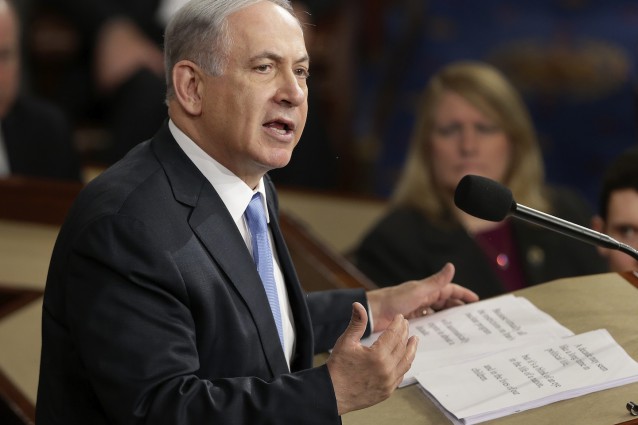Netanyahu and his Likud are running out of time to survive the March 17 ballot
DEBKAfile Exclusive Analysis March 12, 2015
Five days before Israel’s snap election, people who have seen Prime Minister Binyamin Netanyahu close up say he looks weary and, behind his controlled façade, shocked to discover that his Likud party faces the real possibility of being thrown out of office on March 17. At a meeting of the party faithful, Wednesday, March 11, he warned – not once but again and again – that if they don’t get a move on fast, Israel could be stuck with “Bougie and Tzipi” [Yitzhak Herzog and Tzipi Livni co-leaders of the opposition Zionist Camp] as prime ministers. The former Labor party keeps on overtaking Likud in opinion polls – not by much but consistently. When the figures hit 24-25 Knesset seats to his party’s 21, Netanyahu finally bestirred himself to go stumping across the country.
He hasn’t yet lost the race for another term in the prime minister’s office, but he will need to pull some rabbits out of his hat and aces from his sleeve if he wants to be chosen by the president as the most credible candidate for forming the next government. Herzog may get there first.
This campaign has held a couple more surprises and others may be in store in the short time remaining. Future, led by Yair Lapid (former finance minister), has shot up from a single digit to 12-13 in the same opinion polls. He is thinking seriously of setting up a centrist bloc straight after the election results are in, along with the former Likud Communications Minister Moshe Kahlon who struck out with his own Kulanu party (11) for its first campaign, and former Likud partner, Avidor Lieberman’s Yisrael Beteinu.
This threesome believes that together, as the largest political grouping, they can persuade the president to designate Lapid to try and form a government coalition. Against this pretty far-fetched background, Lieberman (currently foreign minister) has been going around saying he expects to be defense minister in the next administration. Kahlon has high hopes of the treasury. This alliance of small parties with big ideas is giving both Netanyahu and Herzog nightmares in the sense that collectively they may be in a position to determine which of the two is designated prime minister.
Depending on the outcome of an election, which it must be said is still up for grabs, the two may still opt to combine to set up a unity government with the premiership rotating between them.
Netanyahu owes his current dire straits to seven causes:
1. For too long he has belabored the Iranian nuclear issue, which may be a hot topic in Washington, but no longer holds the interest of the action-oriented Israeli voter. His rivals point out that he has been talking about it for six years but done very little, and what he has done can’t be revealed. No future Israeli leader can be expected to do more. And so, absurdly, a nuclear-armed Iran has become a non-issue in the very country most threatened.
2. If Netanyahu counted on his spectacular performance before the US Congress to win him the election, he miscalculated. TV screens and front pages at home pushed aside scenes of cheering American lawmakers to make way for unsavory peeks into alleged petty misdemeanors – often trumped up – committed in the household of Netanyahu and his wife Sara. The poison built up insidiously in the public consciousness.
3. The media might have been forced to give more space to Likud leaders had Netanyahu and Defense Minister Moshe Ya’alon made intelligent presentations of their security policy. They might have gained popular ground by pointing to their policies which, by restraint and prudence, were holding back the real menaces besetting the country at every hand: Palestinian radical Hamas, which has been prevented from setting up West Bank rocket positions against Tel Aviv; Hizballah in Lebanon and the creeping Iranian military presence on the Golan.
By avoiding this course, Likud relinquished its strongest card, the security ticket, the only one on which Netanyahu has experience and credibility as prime minister, when compared with any of his rivals, especially the less than macho Herzog.
4. Likud’s leaders also slipped up badly by neglecting to present a remedial program for festering social ills, such as the yawning gap between the haves and the have-nots, the young couples hard put to support families, or first-time voters for whom affordable housing and prices are distant dreams. Contacts with a suffocating bureaucracy make more enemies.
The soundest economy in the West and the country’s first functioning cross-country road and rail system don’t cut it.
4. Likud left it far too late to start electioneering in earnest. Only this week, did Netanyahu start rushing to the rescue in a tardy bid to bring a dull and sluggish campaign to life. The Israeli street responded in kind. In contrast, wherever a prospective voter turned, he and she found Yair Lapid, Naftali Bennett (pro-settlement Habayit Hayehudi leader) and Kahlon (whose numbers have risen to 11) selling their platforms on every doorstep.
5. Netanyahu is also finding that challenging a sitting American president is no vote-catcher in Israel – even if national security at stake. Although Washington’s Middle East policies may be fairly criticized, any political hopeful seen to jeopardize US friendship may expect to pay the price at the ballot box.




















